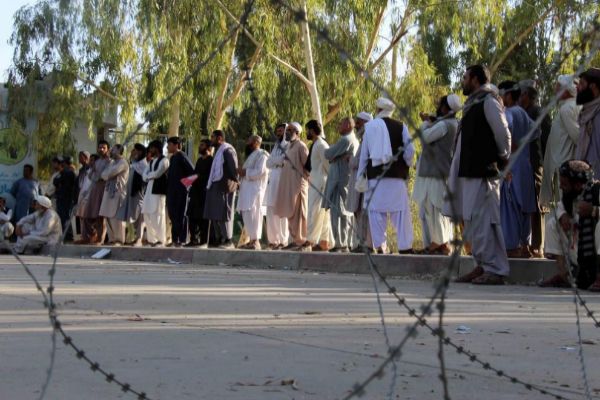- Elections: Afghanistan: where voting can lead to death
- The work of the volunteers: A tide of young Afghans is playing life for democracy
The Abdul Qadir Bedel school opened this morning and ¡bummmm !!! The damage caused by the explosion of a mine on the school wall was a reminder of the current Taliban threat to kill whoever came to vote. But the neighbors of the neighborhood, no case. Eighteen years after the fall of the fundamentalist regime thousands of Afghans gave an example of maturity to terrorists and kleptocrats, staining their finger blue when passing through the urn.
"Despite the bomb, people will come to vote," said the elder Agha Gol Hakparast, representative of the Jairjana district. "My fellow citizens have understood that voting in a democratic system is the best way to change things." Mina, a board member, acknowledged that "there is some fear. But it is time to decide the future. As a woman, I must make sure that I choose a government with a program that favors us. Voting is an act of equality."
Of the 13 candidates for President, the main ones, Ashraf Ghani and Abdullah Abdullah , seek to govern themselves after an experience of chaotic coalition, during which the country has suffered a rebound in violence and a crisis of people's confidence. With the ballot in hand, Ghani announced that "our peace plan" with the Taliban "is ready." His opponent to beat, Abdullah, warned the Taliban that "threatening Afghans will not achieve your goal . " The results are expected to be known at the end of October.
The dignity of Afghans tired of war as well as mediocre leaders, accused each other day and also of filling their pockets with foreign money, was perceived in the eyes of Sultan Abadin, a 79-year-old man sulking at the ballot box , because his name was not on the voter register and, therefore, he could not cast his vote. Or those of Mohamed Charifi, a teacher who decided to go to his place of work, despite being festive, to denounce all the irregularities he detected.
Complex voting system
The biggest problems during the voting had to do with failures in the complex voting system, which increased suspicions of fraud. Proportionally minor incidents because, as feared, the great barrier between voters and the polls was the fear of death. According to the Interior Ministry, extremists launched 68 attacks against elections across the country , which injured 37 civilians and four members of the security forces. Surprisingly, he said, there were only two dead.
Much of the success in the relatively low number of casualties, which Interior defined as an approved "historical test," was the effective deployment of 75,000 soldiers and police by the 4,900 polling stations . The Electoral Board even proclaimed that these were "the best elections in 18 years . " But, despite the strong security measures, fear was able to many and contributed to lower participation, not yet accounted for.
Terror could be seen in the Hazara district of Dasht-e Barchi, the Taliban’s target. The Ali Ary school was deserted. Narges Hovaida, president of a table, confessed: "I don't know if I will still be alive at the end of the day. I see that there is good security, but people no longer trust the Government." A diametrically opposite scenario could be observed, to astonishment, in the Pashtun district of Karta-e-Now, one of the recalcitrant nuclei.
The manager of one of his mosques, enabled as a voting center, celebrated the good influx. "They have even come disabled to vote," he congratulated. Here a crucial political detail could be seen: the presence of extremists favorable to the democratic system, favored by the presidential candidacy of former warlord Gulbuddin Hekmatyar, after signing peace with the Government and leaving behind years leading one of the bloodiest guerrillas.
"While there is occupation we will fight; when it is over, I will believe 100 percent in the elections," summed up the cleric Junaddin Mirbarshad, a staunch follower of the genocidal. "He does defend the real Islam. The rest of the candidates, meanwhile, live as slaves of foreigners and more pending to fill their pockets," he criticized. Beside him, Mahmulá Solan, an unemployed person, was more moderate: "What matters to me is that the new leader seeks peace and progress. I don't care who he is."
According to the criteria of The Trust Project
Know more- Afghanistan
Elections 2019 Spain breaks records: only Greece sunk by the crisis voted four times in four years
Politics Pedro Sánchez postpones negotiations with Podemos and asks everyone for "generosity" so that there are no elections
Basque Country "Unfortunately we are closer to new elections," acknowledges Andoni Ortuzar

